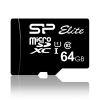Page 2 of 2
Benchmarks
Frankly, in this day and age there’s hardly any point in testing USB 2.0 drives. The interface acts as a bottleneck and most users simply won’t tell the difference in everyday use. If it’s any consolation, neither of the drives was a disappointment, as you can see in the charts and screenshots below.
The downside to both drives is that they are FAT32 formatted, which really isn’t a big deal, as it won’t take long before you reformat them. In our contiguous file test, we used a 1GB .rar archive and in our 1GB random file test we copied 928 files in 12 folders, which is a much more realistic scenario for most business users.
Conclusion
Silicon Power is a rather small company and it might not be the first name that comes to mind when thinking about external storage, but we must admit that we were pleasantly surprised with what they had to offer.
Both drives proved rugged, rather well designed and performance was more than adequate. Coupled with tempting prices, they are a pretty good offer. While many users will simply go for some brand name products, there’s really no reason to shy away from these babies, other than being a bit snobby.
Most portable hard drives are rather rugged and many of them comply with one drop-test standard or another, but small companies like to emphasize such stuff for press coverage or some niche marketing. In this case, there’s really no need to do so.
We simply liked the build quality - both drives feel like they can cope with pretty much anything a reasonable user would throw at them, or anything an intoxicated user might throw them at. They look nice and they’re affordable. In case you need more in terms of performance, Silicon Power also offers A80-series drives with USB 3.0 support.
« Prev Next

